高三口试准备
- 格式:doc
- 大小:176.50 KB
- 文档页数:31
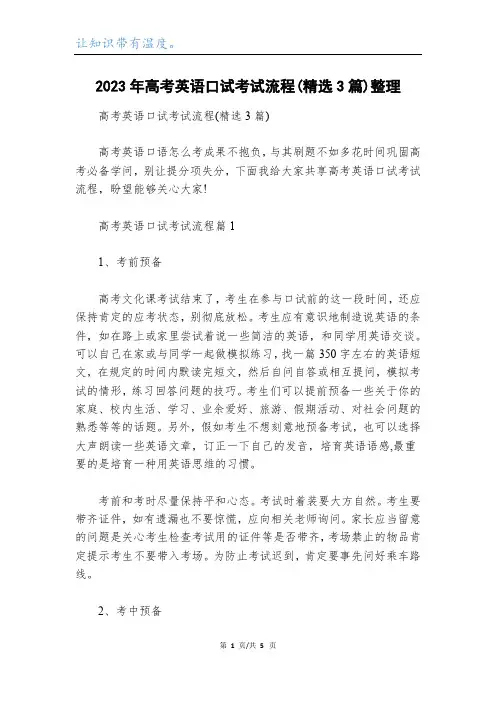
2023年高考英语口试考试流程(精选3篇)整理高考英语口试考试流程(精选3篇)高考英语口语怎么考成果不抱负,与其刷题不如多花时间巩固高考必备学问,别让提分项失分,下面我给大家共享高考英语口试考试流程,盼望能够关心大家!高考英语口试考试流程篇11、考前预备高考文化课考试结束了,考生在参与口试前的这一段时间,还应保持肯定的应考状态,别彻底放松。
考生应有意识地制造说英语的条件,如在路上或家里尝试着说一些简洁的英语,和同学用英语交谈。
可以自己在家或与同学一起做模拟练习,找一篇350字左右的英语短文,在规定的时间内默读完短文,然后自问自答或相互提问,模拟考试的情形,练习回答问题的技巧。
考生们可以提前预备一些关于你的家庭、校内生活、学习、业余爱好、旅游、假期活动、对社会问题的熟悉等等的话题。
另外,假如考生不想刻意地预备考试,也可以选择大声朗读一些英语文章,订正一下自己的发音,培育英语语感,最重要的是培育一种用英语思维的习惯。
考前和考时尽量保持平和心态。
考试时着装要大方自然。
考生要带齐证件,如有遗漏也不要惊慌,应向相关老师询问。
家长应当留意的问题是关心考生检查考试用的证件等是否带齐,考场禁止的物品肯定提示考生不要带入考场。
为防止考试迟到,肯定要事先问好乘车路线。
2、考中预备第一,合理利用备考室的10分钟。
考生拿到试题后,应当快速默读完全文(留意不要出声读,由于出声会影响对短文的理解),登记大意,预备回答老师的提问。
读完以后,要特殊留意带星号或其他特别符号的段落,老师会让考生朗读这一部分。
考生预备回答问题时,“五个W”是最常用的方法,即Who-人物?When-时间?Where-地点?What-大事?How-解决方案。
由于时间有限,所以,遵循这“五个W”原则,可以在最短的时间内理解文章的大意,抓住短文的中心思想。
其次,正确应对即兴陈述。
首先要条理清楚,留意在陈述时,要使用下面一些词,如first?鄄ly,secondly,thirdly,etc.或者是on one hand,on the other hand? 或者是in the first place,in the second place,etc. 其次,要避开频繁使用同一个词或词组。
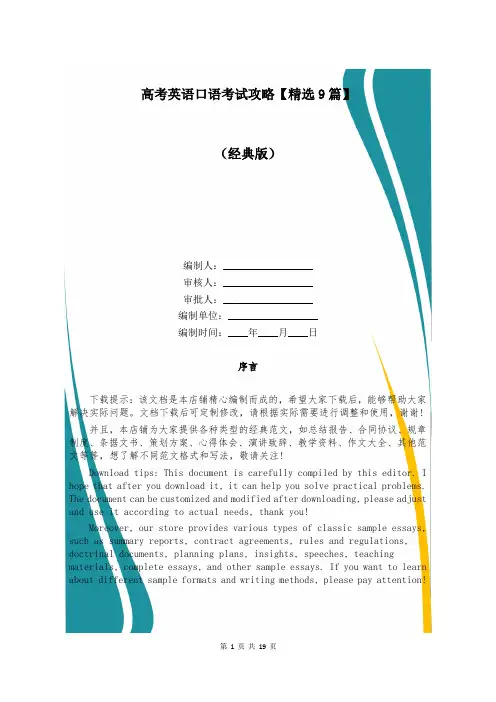
高考英语口语考试攻略【精选9篇】(经典版)编制人:__________________审核人:__________________审批人:__________________编制单位:__________________编制时间:____年____月____日序言下载提示:该文档是本店铺精心编制而成的,希望大家下载后,能够帮助大家解决实际问题。
文档下载后可定制修改,请根据实际需要进行调整和使用,谢谢!并且,本店铺为大家提供各种类型的经典范文,如总结报告、合同协议、规章制度、条据文书、策划方案、心得体会、演讲致辞、教学资料、作文大全、其他范文等等,想了解不同范文格式和写法,敬请关注!Download tips: This document is carefully compiled by this editor. I hope that after you download it, it can help you solve practical problems. The document can be customized and modified after downloading, please adjust and use it according to actual needs, thank you!Moreover, our store provides various types of classic sample essays, such as summary reports, contract agreements, rules and regulations, doctrinal documents, planning plans, insights, speeches, teaching materials, complete essays, and other sample essays. If you want to learn about different sample formats and writing methods, please pay attention!高考英语口语考试攻略【精选9篇】高考英语口语考试由各省市自行组织,主要是为准备报考外语类院校及外语类相关专业的考生设置的一项测试。
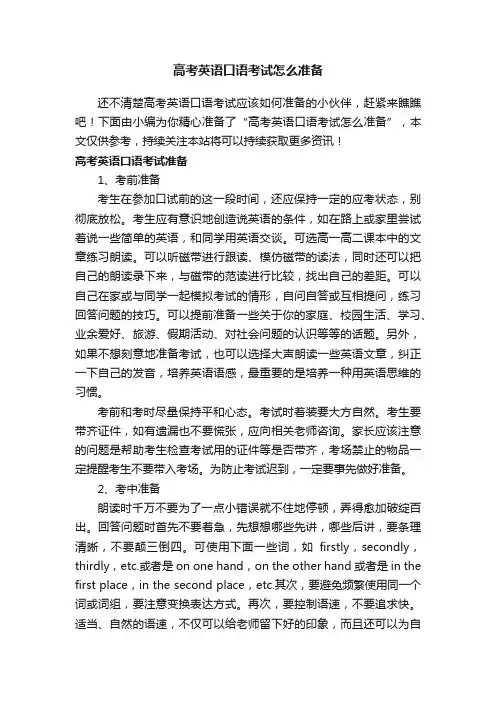
高考英语口语考试怎么准备还不清楚高考英语口语考试应该如何准备的小伙伴,赶紧来瞧瞧吧!下面由小编为你精心准备了“高考英语口语考试怎么准备”,本文仅供参考,持续关注本站将可以持续获取更多资讯!高考英语口语考试准备1、考前准备考生在参加口试前的这一段时间,还应保持一定的应考状态,别彻底放松。
考生应有意识地创造说英语的条件,如在路上或家里尝试着说一些简单的英语,和同学用英语交谈。
可选高一高二课本中的文章练习朗读。
可以听磁带进行跟读、模仿磁带的读法,同时还可以把自己的朗读录下来,与磁带的范读进行比较,找出自己的差距。
可以自己在家或与同学一起模拟考试的情形,自问自答或互相提问,练习回答问题的技巧。
可以提前准备一些关于你的家庭、校园生活、学习、业余爱好、旅游、假期活动、对社会问题的认识等等的话题。
另外,如果不想刻意地准备考试,也可以选择大声朗读一些英语文章,纠正一下自己的发音,培养英语语感,最重要的是培养一种用英语思维的习惯。
考前和考时尽量保持平和心态。
考试时着装要大方自然。
考生要带齐证件,如有遗漏也不要慌张,应向相关老师咨询。
家长应该注意的问题是帮助考生检查考试用的证件等是否带齐,考场禁止的物品一定提醒考生不要带入考场。
为防止考试迟到,一定要事先做好准备。
2、考中准备朗读时千万不要为了一点小错误就不住地停顿,弄得愈加破绽百出。
回答问题时首先不要着急,先想想哪些先讲,哪些后讲,要条理清晰,不要颠三倒四。
可使用下面一些词,如firstly,secondly,thirdly,etc.或者是on one hand,on the other hand或者是in the first place,in the second place,etc.其次,要避免频繁使用同一个词或词组,要注意变换表达方式。
再次,要控制语速,不要追求快。
适当、自然的语速,不仅可以给老师留下好的印象,而且还可以为自己争取更多思考的时间。
最后,避免使用长句或复杂句子。
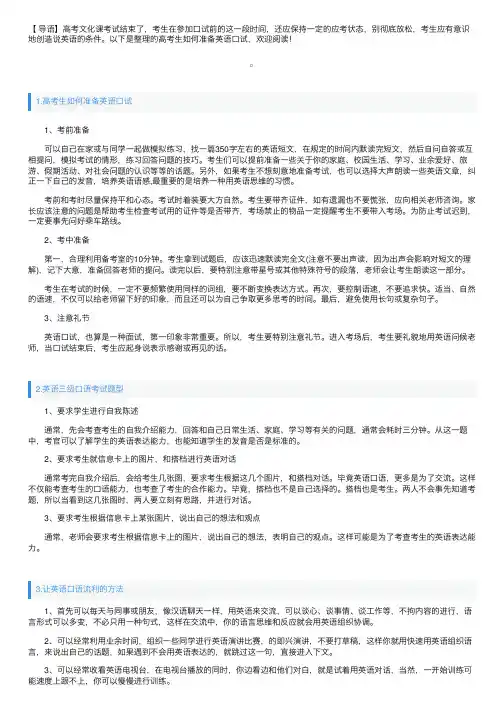
【导语】⾼考⽂化课考试结束了,考⽣在参加⼝试前的这⼀段时间,还应保持⼀定的应考状态,别彻底放松,考⽣应有意识地创造说英语的条件。
以下是整理的⾼考⽣如何准备英语⼝试,欢迎阅读!1.⾼考⽣如何准备英语⼝试 1、考前准备 可以⾃⼰在家或与同学⼀起做模拟练习,找⼀篇350字左右的英语短⽂,在规定的时间内默读完短⽂,然后⾃问⾃答或互相提问,模拟考试的情形,练习回答问题的技巧。
考⽣们可以提前准备⼀些关于你的家庭、校园⽣活、学习、业余爱好、旅游、假期活动、对社会问题的认识等等的话题。
另外,如果考⽣不想刻意地准备考试,也可以选择⼤声朗读⼀些英语⽂章,纠正⼀下⾃⼰的发⾳,培养英语语感,最重要的是培养⼀种⽤英语思维的习惯。
考前和考时尽量保持平和⼼态。
考试时着装要⼤⽅⾃然。
考⽣要带齐证件,如有遗漏也不要慌张,应向相关⽼师咨询。
家长应该注意的问题是帮助考⽣检查考试⽤的证件等是否带齐,考场禁⽌的物品⼀定提醒考⽣不要带⼊考场。
为防⽌考试迟到,⼀定要事先问好乘车路线。
2、考中准备 第⼀,合理利⽤备考室的10分钟。
考⽣拿到试题后,应该迅速默读完全⽂(注意不要出声读,因为出声会影响对短⽂的理解),记下⼤意,准备回答⽼师的提问。
读完以后,要特别注意带星号或其他特殊符号的段落,⽼师会让考⽣朗读这⼀部分。
考⽣在考试的时候,⼀定不要频繁使⽤同样的词组,要不断变换表达⽅式。
再次,要控制语速,不要追求快。
适当、⾃然的语速,不仅可以给⽼师留下好的印象,⽽且还可以为⾃⼰争取更多思考的时间。
最后,避免使⽤长句或复杂句⼦。
3、注意礼节 英语⼝试,也算是⼀种⾯试,第⼀印象⾮常重要。
所以,考⽣要特别注意礼节。
进⼊考场后,考⽣要礼貌地⽤英语问候⽼师,当⼝试结束后,考⽣应起⾝说表⽰感谢或再见的话。
2.英语三级⼝语考试题型 1、要求学⽣进⾏⾃我陈述 通常,先会考查考⽣的⾃我介绍能⼒,回答和⾃⼰⽇常⽣活、家庭、学习等有关的问题,通常会耗时三分钟。
从这⼀题中,考官可以了解学⽣的英语表达能⼒,也能知道学⽣的发⾳是否是标准的。
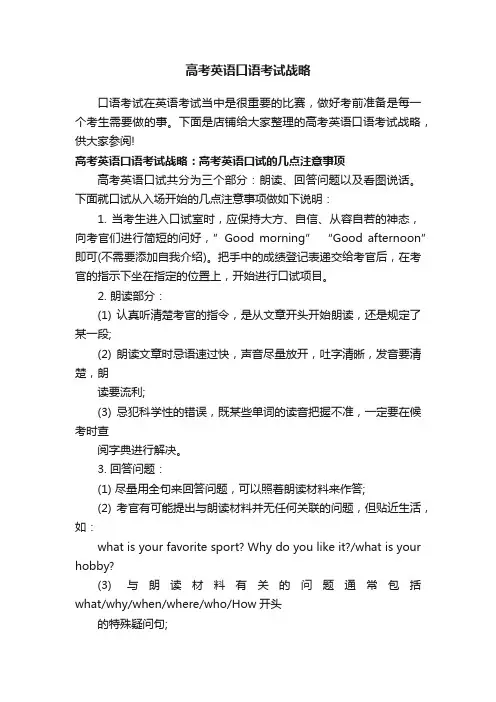
高考英语口语考试战略口语考试在英语考试当中是很重要的比赛,做好考前准备是每一个考生需要做的事。
下面是店铺给大家整理的高考英语口语考试战略,供大家参阅!高考英语口语考试战略:高考英语口试的几点注意事项高考英语口试共分为三个部分:朗读、回答问题以及看图说话。
下面就口试从入场开始的几点注意事项做如下说明:1. 当考生进入口试室时,应保持大方、自信、从容自若的神态,向考官们进行简短的问好,”Good morning” “Good afternoon”即可(不需要添加自我介绍)。
把手中的成绩登记表递交给考官后,在考官的指示下坐在指定的位置上,开始进行口试项目。
2. 朗读部分:(1) 认真听清楚考官的指令,是从文章开头开始朗读,还是规定了某一段;(2) 朗读文章时忌语速过快,声音尽量放开,吐字清晰,发音要清楚,朗读要流利;(3) 忌犯科学性的错误,既某些单词的读音把握不准,一定要在候考时查阅字典进行解决。
3. 回答问题:(1) 尽量用全句来回答问题,可以照着朗读材料来作答;(2) 考官有可能提出与朗读材料并无任何关联的问题,但贴近生活,如:what is your favorite sport? Why do you like it?/what is your hobby?(3) 与朗读材料有关的问题通常包括what/why/when/where/who/How开头的特殊疑问句;(4) 考生必须要注意的题型是:反意疑问句以及选择疑问句。
切记,不要把选择疑问句当成了一般疑问句来作答。
(5) 听不清或没听懂考官提问,可以说pardon.4. 看图说话(1) 看图说话,考官发出的指令是talk about the picture;(2) 语言组织要通顺,说话时不要发出“er..en..”等,且出现长时间的卡壳,所以说话时不要急,切忌语速过快。
(3) 对优秀的要求是能说到五句话以上,考生尽量用所学过的一些漂亮的短语和词组。
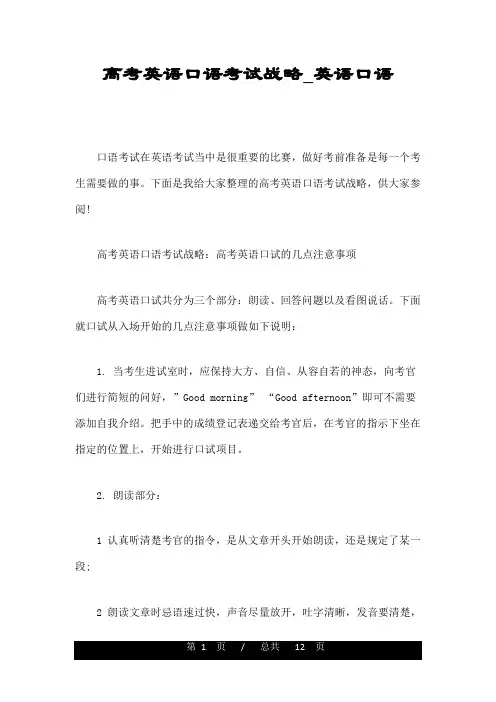
高考英语口语考试战略_英语口语口语考试在英语考试当中是很重要的比赛,做好考前准备是每一个考生需要做的事。
下面是我给大家整理的高考英语口语考试战略,供大家参阅!高考英语口语考试战略:高考英语口试的几点注意事项高考英语口试共分为三个部分:朗读、回答问题以及看图说话。
下面就口试从入场开始的几点注意事项做如下说明:1. 当考生进试室时,应保持大方、自信、从容自若的神态,向考官们进行简短的问好,”Good morning” “Good afternoon”即可不需要添加自我介绍。
把手中的成绩登记表递交给考官后,在考官的指示下坐在指定的位置上,开始进行口试项目。
2. 朗读部分:1 认真听清楚考官的指令,是从文章开头开始朗读,还是规定了某一段;2 朗读文章时忌语速过快,声音尽量放开,吐字清晰,发音要清楚,朗读要流利;3 忌犯科学性的错误,既某些单词的读音把握不准,一定要在候考时查阅字典进行解决。
3. 回答问题:1 尽量用全句来回答问题,可以照着朗读材料来作答;2 考官有可能提出与朗读材料并无任何关联的问题,但贴近生活,如:what is your favorite sport? Why do you like it?/what is your hobby?3 与朗读材料有关的问题通常包括what/why/when/where/who/How开头的特殊疑问句;4 考生必须要注意的题型是:反意疑问句以及选择疑问句。
切记,不要把选择疑问句当成了一般疑问句来作答。
5 听不清或没听懂考官提问,可以说pardon.4. 看图说话1 看图说话,考官发出的指令是talk about the picture;2 语言组织要通顺,说话时不要发出“er..en..”等,且出现长时间的卡壳,所以说话时不要急,切忌语速过快。
3 对优秀的要求是能说到五句话以上,考生尽量用所学过的一些漂亮的短语和词组。
语句上最好能用上几个从句,这方可使考官眼前一亮。
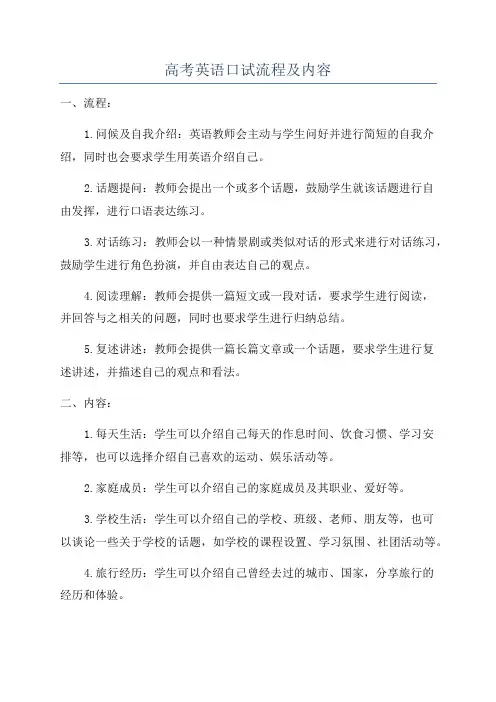
高考英语口试流程及内容一、流程:1.问候及自我介绍:英语教师会主动与学生问好并进行简短的自我介绍,同时也会要求学生用英语介绍自己。
2.话题提问:教师会提出一个或多个话题,鼓励学生就该话题进行自由发挥,进行口语表达练习。
3.对话练习:教师会以一种情景剧或类似对话的形式来进行对话练习,鼓励学生进行角色扮演,并自由表达自己的观点。
4.阅读理解:教师会提供一篇短文或一段对话,要求学生进行阅读,并回答与之相关的问题,同时也要求学生进行归纳总结。
5.复述讲述:教师会提供一篇长篇文章或一个话题,要求学生进行复述讲述,并描述自己的观点和看法。
二、内容:1.每天生活:学生可以介绍自己每天的作息时间、饮食习惯、学习安排等,也可以选择介绍自己喜欢的运动、娱乐活动等。
2.家庭成员:学生可以介绍自己的家庭成员及其职业、爱好等。
3.学校生活:学生可以介绍自己的学校、班级、老师、朋友等,也可以谈论一些关于学校的话题,如学校的课程设置、学习氛围、社团活动等。
4.旅行经历:学生可以介绍自己曾经去过的城市、国家,分享旅行的经历和体验。
5.偶像与英雄:学生可以介绍自己的偶像,以及该偶像给自己带来的影响和启示。
6.个人兴趣:学生可以介绍自己喜欢的音乐、电影、运动等兴趣爱好,并解释为什么喜欢这些。
7.社会问题:学生可以谈论一些与社会相关的问题,如环境保护、垃圾分类、青少年犯罪等,表达自己的看法与观点。
以上内容仅为高考英语口试流程及内容的一种可能性,实际口试内容可能根据学校和教师的具体要求而有所不同。
为了顺利通过口试,学生应提前准备好口语练习,扩充词汇量,并积极参与口语练习课程和活动。
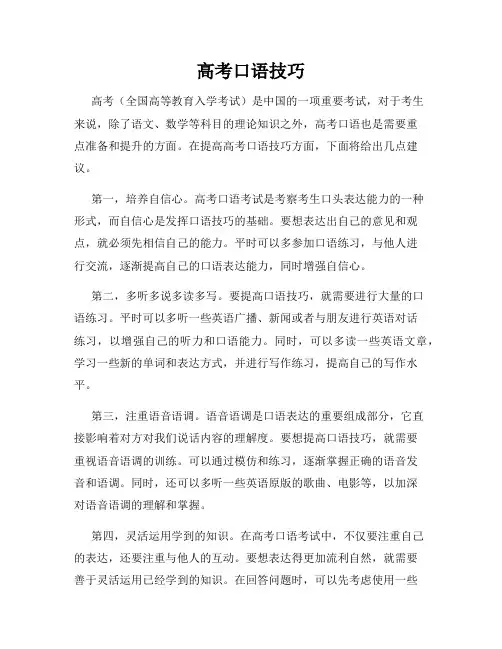
高考口语技巧高考(全国高等教育入学考试)是中国的一项重要考试,对于考生来说,除了语文、数学等科目的理论知识之外,高考口语也是需要重点准备和提升的方面。
在提高高考口语技巧方面,下面将给出几点建议。
第一,培养自信心。
高考口语考试是考察考生口头表达能力的一种形式,而自信心是发挥口语技巧的基础。
要想表达出自己的意见和观点,就必须先相信自己的能力。
平时可以多参加口语练习,与他人进行交流,逐渐提高自己的口语表达能力,同时增强自信心。
第二,多听多说多读多写。
要提高口语技巧,就需要进行大量的口语练习。
平时可以多听一些英语广播、新闻或者与朋友进行英语对话练习,以增强自己的听力和口语能力。
同时,可以多读一些英语文章,学习一些新的单词和表达方式,并进行写作练习,提高自己的写作水平。
第三,注重语音语调。
语音语调是口语表达的重要组成部分,它直接影响着对方对我们说话内容的理解度。
要想提高口语技巧,就需要重视语音语调的训练。
可以通过模仿和练习,逐渐掌握正确的语音发音和语调。
同时,还可以多听一些英语原版的歌曲、电影等,以加深对语音语调的理解和掌握。
第四,灵活运用学到的知识。
在高考口语考试中,不仅要注重自己的表达,还要注重与他人的互动。
要想表达得更加流利自然,就需要善于灵活运用已经学到的知识。
在回答问题时,可以先考虑使用一些常用的表达方式和句型,然后根据具体情况进行调整和变化,以使自己的回答更加准确和生动。
第五,注意礼貌和谦逊。
在高考口语考试中,除了表达能力之外,还需要注重礼貌和谦逊的态度。
在进行口语交流时,要注意礼貌用语和好的沟通方式,尊重他人的意见并进行恰当的回应。
同时,要保持谦逊的态度,虚心接受他人的批评和建议,并不断提高自己的口语水平。
总结起来,提高高考口语技巧需要培养自信心、进行大量的口语练习、注重语音语调的训练、灵活运用已学知识以及注意礼貌和谦逊的态度。
通过不断的努力和练习,相信每位考生都可以在高考口语考试中取得好的成绩。
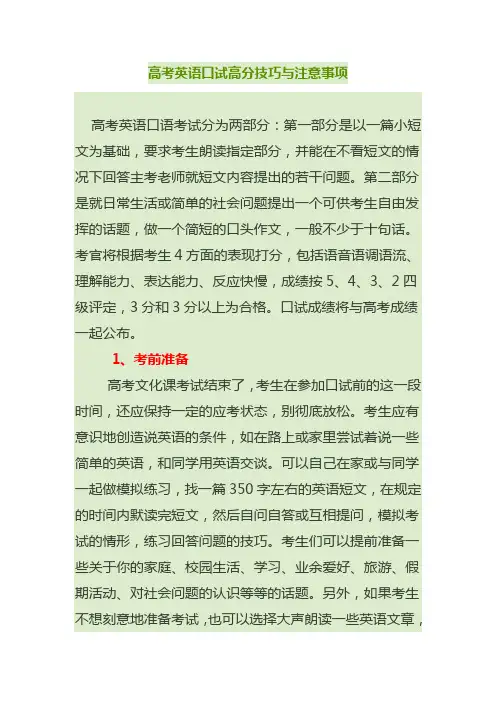
高考英语口试高分技巧与注意事项高考英语口语考试分为两部分:第一部分是以一篇小短文为基础,要求考生朗读指定部分,并能在不看短文的情况下回答主考老师就短文内容提出的若干问题。
第二部分是就日常生活或简单的社会问题提出一个可供考生自由发挥的话题,做一个简短的口头作文,一般不少于十句话。
考官将根据考生4方面的表现打分,包括语音语调语流、理解能力、表达能力、反应快慢,成绩按5、4、3、2四级评定,3分和3分以上为合格。
口试成绩将与高考成绩一起公布。
1、考前准备高考文化课考试结束了,考生在参加口试前的这一段时间,还应保持一定的应考状态,别彻底放松。
考生应有意识地创造说英语的条件,如在路上或家里尝试着说一些简单的英语,和同学用英语交谈。
可以自己在家或与同学一起做模拟练习,找一篇350字左右的英语短文,在规定的时间内默读完短文,然后自问自答或互相提问,模拟考试的情形,练习回答问题的技巧。
考生们可以提前准备一些关于你的家庭、校园生活、学习、业余爱好、旅游、假期活动、对社会问题的认识等等的话题。
另外,如果考生不想刻意地准备考试,也可以选择大声朗读一些英语文章,纠正一下自己的发音,培养英语语感,最重要的是培养一种用英语思维的习惯。
考前和考时尽量保持平和心态。
考试时着装要大方自然。
考生要带齐证件,如有遗漏也不要慌张,应向相关老师咨询。
家长应该注意的问题是帮助考生检查考试用的证件等是否带齐,考场禁止的物品一定提醒考生不要带入考场。
为防止考试迟到,一定要事先问好乘车路线。
2、考中准备第一,合理利用备考室的10分钟。
考生拿到试题后,应该迅速默读完全文(注意不要出声读,因为出声会影响对短文的理解),记下大意,准备回答老师的提问。
读完以后,要特别注意带星号或其他特殊符号的段落,老师会让考生朗读这一部分。
考生准备回答问题时,“五个W”是最常用的方法,即 Who-人物?When-时间?Where-地点?What-事件?How-解决方案。
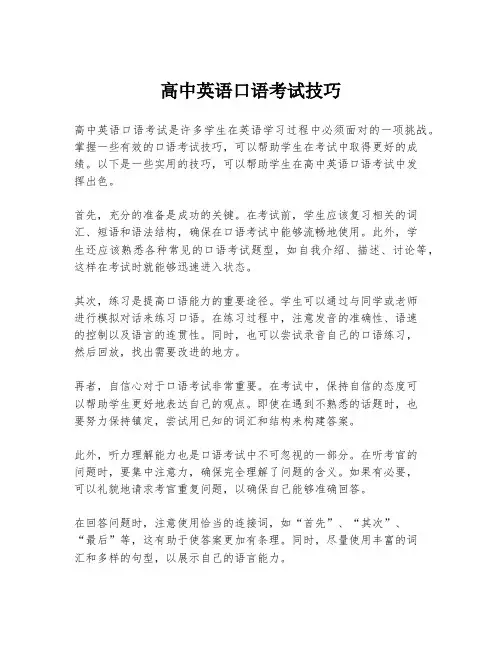
高中英语口语考试技巧高中英语口语考试是许多学生在英语学习过程中必须面对的一项挑战。
掌握一些有效的口语考试技巧,可以帮助学生在考试中取得更好的成绩。
以下是一些实用的技巧,可以帮助学生在高中英语口语考试中发挥出色。
首先,充分的准备是成功的关键。
在考试前,学生应该复习相关的词汇、短语和语法结构,确保在口语考试中能够流畅地使用。
此外,学生还应该熟悉各种常见的口语考试题型,如自我介绍、描述、讨论等,这样在考试时就能够迅速进入状态。
其次,练习是提高口语能力的重要途径。
学生可以通过与同学或老师进行模拟对话来练习口语。
在练习过程中,注意发音的准确性、语速的控制以及语言的连贯性。
同时,也可以尝试录音自己的口语练习,然后回放,找出需要改进的地方。
再者,自信心对于口语考试非常重要。
在考试中,保持自信的态度可以帮助学生更好地表达自己的观点。
即使在遇到不熟悉的话题时,也要努力保持镇定,尝试用已知的词汇和结构来构建答案。
此外,听力理解能力也是口语考试中不可忽视的一部分。
在听考官的问题时,要集中注意力,确保完全理解了问题的含义。
如果有必要,可以礼貌地请求考官重复问题,以确保自己能够准确回答。
在回答问题时,注意使用恰当的连接词,如“首先”、“其次”、“最后”等,这有助于使答案更加有条理。
同时,尽量使用丰富的词汇和多样的句型,以展示自己的语言能力。
最后,考试结束后,不要忘记进行反思和总结。
分析自己在考试中的表现,找出优点和不足,为下一次的口语考试做好准备。
通过以上的技巧,学生可以在高中英语口语考试中取得更好的成绩。
记住,持续的练习和积极的态度是成功的关键。

高三口语注意事项与备考建议口语考试在高三阶段扮演着重要的角色,不仅对学生的口头表达能力进行考察,同时也是对学生综合能力的一次全面测评。
为了帮助同学们在高三口语考试中取得好成绩,本文将分享一些口语考试的注意事项与备考建议。
一、注意事项1. 注重平时积累:口语考试的成绩不能一蹴而就,需要平时的积累。
同学们应该养成每天坚持练习口语的习惯,可以通过与同学、老师或家人进行口语对话练习,提高口语表达的流利程度。
2. 提前准备:考试前应预先了解考试内容与形式,并根据要求进行针对性的准备。
可以参考往年的口语试题,通过模拟口语考试来提前熟悉考试流程与节奏,增强信心。
3. 声音表达清晰:在口语考试中,清晰的声音表达是非常重要的。
同学们应该注意发声的准确性和清晰度,尤其是在复杂的语境下,要保持措辞简洁明了,让对话对方能够清晰地听到你的发言。
4. 语速与停顿:适当的语速与停顿有助于提高口语表达的流畅度。
过快的语速容易使人难以理解,而过慢的语速则容易让人感到枯燥无味。
在表达过程中,合理安排停顿,让对话更加自然流畅。
5. 注意肢体语言:肢体语言是口语交流中重要的非语言要素之一。
同学们在表达时要注重肢体语言的运用,例如适当的手势、面部表情和眼神交流,能够使对话更加生动有趣。
二、备考建议1. 增加词汇量:扩大词汇量是口语考试的基础。
同学们可以通过背诵英语短语、遗忘词汇表以及阅读英语文章来积累词汇。
在备考过程中,要注重词汇的运用和搭配,提高口语表达的准确性和流利度。
2. 锻炼听力技巧:口语考试中,对听力的要求相对较高。
同学们可以通过听英语广播、音频资料或参与英语角等方式来提高自己的听力水平。
在备考过程中,要加强对听力材料的理解和分析能力,提高听力反应的准确性。
3. 多练口语对话:口语考试的主要目的是为了检验学生的口头表达能力。
因此,同学们应多练习口语对话,可以拓展话题的广度与深度,提高回答问题的能力。
通过与他人进行口语对话,可以让自己更好地适应与人交流的场景,并提高口语思维的迅速性。
高中英语考试口语备考策略在准备高中英语考试口语时,学生们常常感到压力很大。
他们需要面对各种不同的考题和复杂的语境。
然而,他们可以通过有效的备考策略来增强信心并取得成功。
首先,了解考试要求就像了解一个新朋友一样重要。
考生们应该详细研究考试的格式和内容,掌握每个部分的要求和评分标准。
这种了解将帮助他们准确把握考试的重点,避免在无关紧要的细节上浪费时间。
其次,像准备一场重要的演讲一样准备口语考试。
想象你是一位演说家,需要通过语言来表达清晰而有力的观点。
练习流利地表达想法,并注意语调和语速的控制。
这种准备不仅帮助提高口语表达能力,也有助于减少紧张感。
进一步地,与语言“交流”,就像与朋友聊天一样。
积极参与英语对话,无论是与老师、同学还是语言伙伴,都可以帮助学生提升口语流利度和自信心。
通过反复练习和模拟真实考试情境,他们可以更好地适应考试环境并优雅应对各种问题。
另外,记得注重语言的准确性和多样性,就像关心一个家庭成员一样。
努力扩展词汇量,掌握各种句式结构,并学会灵活运用,这些都是成功备考的关键。
通过阅读和写作来提高语言的理解和应用能力,可以有效地提升口语表达的深度和广度。
最后,保持积极的心态,就像对待一个充满挑战的旅程一样。
高中英语口语考试是一个展示自己语言能力的机会,每一次练习和反馈都是成长的一部分。
学生们应该坚信自己的努力会带来成功,勇敢地面对挑战,并从中汲取经验教训。
综上所述,准备高中英语口语考试并不仅仅是应付一个测试,而是一个全面提升语言能力和自信心的过程。
通过有效的备考策略,如了解考试要求、准备演讲、积极交流、注重语言细节和保持积极心态,学生们可以在考试中展现出色,为自己的未来奠定坚实的语言基础。
高考口语听说考试技巧
高考口语听说考试有一些技巧可以参考,以下是一些建议:
1. 录音不宜太心急。
一到录音时间就开始录音,避免因准备不足导致录音失败。
2. 大声说英语。
在考试中,只要能说出相关的英语,不管是一个一个短语,还是一个并不是很完整的句子,都会给分。
3. 说好前几句。
第一印象很重要,用较好语音和语调,自信地把开头说出来,会给老师留下良好的印象,可能会得到高分。
4. 善于自然纠正。
在考试过程中,发现自己回答错了,只要时间允许,可以自然纠正过来,评卷老师会以考生最后纠正过来的答案给分。
5. 巧练自信的声音。
保持自信,字正腔圆的表达会打动评卷老师,得分就会高一些。
6. 平时注意创造一定的听、说环境。
听、说是一种语言交流,如果没有外语环境或听说的条件,只靠单枪匹马很难收效。
可以录制课文、对话和中外成品磁带反复听和模仿。
还可以把自己的口头作文和复述录下来,仔细审听,发现问题,及时纠正。
7. 要有不怕听错、说错、不断苦练的精神。
练习听说的学习者,特别是成年人,往往必听错、说错,不敢主支张口练习。
然而,语言是一种习惯,没有
反复的操练和实践难以产生熟练的技巧。
只要达到交流思想的目的,这种听、说实践就应该说是基本成功的。
出了错,注意总结经验,自学改正就是了。
总的来说,要取得好的口语成绩,除了技巧外,还需要大量的实践和练习。
高考英语口语考试准备口语考试在高考英语考试中举足轻重,它是检验学生英语交流能力的重要途径。
为了在口语考试中取得好成绩,同学们需要做好充分的准备。
本文将从多个方面给同学们提供一些建议和技巧,帮助大家有效备考口语考试。
一、提高听力技巧要提高口语水平,首先需要提高听力技巧。
同学们可以通过以下方法来提高听力能力:1. 多听英语材料:可以通过听英语广播、英语电视节目和英语歌曲来提高听力能力。
2. 利用多媒体学习资源:可以使用英语学习网站或者手机应用程序来听力训练,不断提高自己的听力水平。
3. 听录音:可以找一些英语听力材料进行跟读,模仿发音和语调,提高自己的口语表达能力。
二、拓展词汇量在口语考试中,词汇量是非常重要的。
同学们可以通过以下方法来拓展自己的词汇量:1. 多读英语原版书籍:阅读是积累词汇的最佳途径之一。
同学们可以选择适合自己水平的英语原版书籍进行阅读,并积极记录生词,扩大词汇量。
2. 背单词:可以通过背单词卡片或者手机应用程序来记忆词汇,保持每天的单词学习量。
3. 学习词组和固定搭配:除了掌握单词的意思,同学们还可以学习一些常用的词组和固定搭配,提高自己的口语表达能力。
三、模拟口语考试模拟口语考试是提高口语能力的重要方法。
同学们可以邀请一位英语老师或者同学来扮演考官,进行模拟口语考试。
在模拟考试中,同学们需要注意以下几点:1. 注意语速和语调:要保持流畅的口语表达,注意语速和语调的合理运用。
2. 练习回答常见问题:可以事先准备一些常见的问题,进行反复练习,以便在考试中能够清晰、自然地回答问题。
3. 注意语法和发音:口语考试中不仅要注意词汇的使用,还需要注意语法和发音的准确性。
四、参加口语角和英语角活动参加口语角和英语角活动可以提供一个与他人进行英语对话的机会,提高自己的口语表达能力。
同学们可以通过以下方法来积极参加对话活动:1. 参加学校组织的英语角活动:学校通常会组织一些英语角活动,同学们可以积极参与,和其他同学进行英语对话。
口试技巧充分准备与自信表达在现代社会中,口语表达的能力是非常重要的。
无论是在学校还是在职场中,我们都会经常面临口试的情况,因此学会充分准备和自信地表达是非常关键的。
本文将为大家介绍一些口试技巧,帮助大家更好地准备口试并自信地进行表达。
第一部分:充分准备在参加口试之前,我们必须进行充分的准备工作。
首先,我们需要熟悉口试的内容和形式。
了解口试的题目类型、时间限制和评分标准等关键信息,可以帮助我们更好地准备。
其次,我们可以通过阅读相关文章、参加口语培训班或者和他人进行练习来提高口语能力。
通过不断的练习,我们可以熟悉口试的流程,增强自信心。
最后,我们还可以利用一些学习资源,如口试模拟题、口语词汇表等,来帮助我们更好地备考口试。
第二部分:自信表达自信表达是在口试中非常重要的一点。
首先,我们要保持良好的心态。
在口试前,不要过于紧张和焦虑,要相信自己的实力。
记住,口试只是一个展示自己的机会,不必过分担心。
其次,我们要讲话时流利和自然。
用简短的句子来表达自己的想法,避免长篇大论。
掌握一些口语表达的技巧,如使用适当的过渡词、用举例来支持自己的观点等,可以帮助我们更好地进行口试。
此外,我们还要注意细节。
良好的肢体语言、流畅的语速和正确的发音,都是给出良好印象的关键要素。
最后,我们应该保持积极的态度。
无论是面对难题还是出现小错误,都要保持乐观的心态,相信自己可以克服困难。
口试技巧的充分准备和自信表达是取得成功的关键。
只有通过充分的准备和自信的表达,我们才能展现自己的潜力和能力。
在口试中,我们要通过熟悉题目内容、加强口语能力和利用学习资源等方式进行准备。
同时,我们要保持良好的心态、流利和自然的讲话方式,注意细节和保持积极的态度。
相信通过这些技巧的运用,我们可以在口试中获得更好的表现和结果。
通过本文的介绍,我们可以看到口试技巧的重要性,以及如何充分准备和自信表达。
希望大家可以积极运用这些技巧,在口试中获得好成绩,展现自己的才华和能力。
——Ctrl C+V大法自某网站一、祝愿、祝贺和应答(Good wishes, congratulations and responses)1.- Well done and congratulations to you.- Thanks very much.2.- I hope you''ll succeed in everything.- So do I.3.- I wish you success.- Thank you.4.- We send you our best wishes.- Thank you very much.5.- Happy new year !- Happy new year! (The same to you.)6.- A merry Christmas to you.- Thank you.7.- I hope you''ll have a good time.- Thank you.8.- Happy birthday!- Thank you.二、邀請和应答(Invitations and responses)1.- Would you like to come to the party?- Oh yes, thank you.2.- I hope you can come to the dance next Saturday.- I''m sorry, but I can''t.3.- Will you go dancing with us?- Of course. I''ll be glad to.4.- Will you come to our English Evening?- Yes, thank you.5.- Would you please give us a talk on English Learning?- OK. When?6.- You and your friends must come over to my house and see mooncakes.- OK. Thank you very much.三、表示同意和不同意(Expressing agreement and disagreement)1.- I think the shop is closed at this time of day.- No, I think it''s open.2.- I think foreign languages are more interesting than science.- I really can''t agree with you. I prefer science.3.- I think I shall read a book instead.- Good idea. That''s much better than watching a bad TV Programme.4.- I don''t think that it''s true. He''s always telling strange stories.- I know. But this time I can''t decide if he is right or not.5.- I think Chinese is more popular than any other subject.- Maybe. But I prefer art.6.- Don''t think in Chinese when you''re speaking English.- You are quite right.四、道歉和应答(Apologies and responses)1.- Sorry to trouble you.- That''s all right.2.- Oh, I am so sorry.- That''s quite all right.3.- I''m sorry to give you so much trouble.- No trouble at all.4.- I''m soory. I lost the key to your bike.- It doesn''t matter.5.- Sorry to have kept you waiting for a long time.- It doesn''t matter.6.- You haven''t paid for it yet.- Oh, I''m really very sorry.五、劝告和建议(Advice and suggestions)1.- The park isn''t far from here. Shall we walk there?- OK.2.- You''d better close the windows. It''s cold in the room.- All right.3.- If you are not better by then, I''ll take you to see the doctor. - OK. Thank you very much.4.- You must look after yourself and keep healthy.- Yes, I will. Thanks.5.- The museum is very far from here. Let''catch a bus, shall we? - OK. Let''s catch a bus.6.- You must remember the saying: Whatever you do, do it well. - Thank you for your advice.六、打电话(Making telephone calls)1.- Hello!- Hello, Bill?- No, this is Sam.- Hi, Sam. This is Mike. How are you?2.- Hello.- Hello. May I speak to Mr Green?3.- No. 5 Middle School.- Mr Green, please.- I''m sorry. Mr Green is not in.- When will he be back?- About six this afternoon.- All right. I''ll ring again then.- Very well.4.- Hello!- Hello, Ham Mei. Could I borrow your Chinese-English Dictionary please? - Sorry! It''s not a very good line. Could you speak more loudly?- Could I borrow your Chinese-English dictionary?- Sure. I''ll bring it to you tomorrow.- Thank you. Goodbye.七、請求允許和应答(Asking for permission and responses)1.- Please let me help you.- No, thanks. I can handle it.2.- Can I see your licence, please?- OK, here you are3.- May I call you James?- Of course, if you wish.4.- Could I borrow a pen, please?- Of course. With pleasure.5.- Excuse me. May I use your dictionary?- Yes, here you are.6.- May I ask you several questions?- Yes, of course.八、提供… 和应答(Offers and responses)1.- May I help you?- Oh yes, thank you.2.- Let me help you with the bags.- Well, I can manage all right. Thanks just the same.3.- Can we help you?- I want to go to hospital. But I can''t. My leg hurts.4.- Must I clean the classroom now?- Oh, you needn''t.5.- Would you like a cup of tea?- Yes, please.6.- What can I do for you?- I''d like to have an English-English dictionary.九、问路和应答(Asking the way and responses)1.- Excuse me. Where is the washroom, please?- Oh, it''s over there.2.- Excuse me. Can you tell me where the bookshop is?- Look! It''s on the other side of the road.3.- How far is the post office, please?- Only a few kilometers.4.- Will you please tell me the way to the railway station?- Go down this street. At the end of the road you''ll see it.5.- Excuse me. Could you tell me how I can get to the supermarket?- Go straight along this road. Then go over the br idge and turn right at the bookshop. You''ll find it.十、购物(Shopping)1.- What can I do for you?- I''d like some apples.2.- Where can I buy some stationery?- Let''s look at the shopping guide. Oh, it''s on the ground Floor.3.- Could I buy half a kilo oranges?- Certainly. Here you are.4.- Will you please show me that radio?- Certainly.5.- How much is the radio?- Ninety yuan.6.- Good morning, sir. May I help you?- Yes, I''d like to buy a sweather.十一、谈论天气(Talking about the weather)1.- It''s a fine day for a walk.- Yes, the air is nice and clean.2.- Oh dear! It''s very cold today.- Yes, you need to wear warmer clothes.3.- What''s the weather like today?- It''s fine.4.- What''s the weather like in your country now?- It''s very hot.5.- Lovely weather, isn''t it?- Yes, isn''t it?6.- I missed the weather report this morning. Did you hear it?- Yes. It said partly cloudy today, with a strong wind from The northwest.十二、时间或日期和应答(Asking the time or date and responses)1.- Hi, Mary. What time is it now?- It''s about three.2.- What day is it today?- It''s Wednesday.3.- Excuse me. Could you tell me what time the plane leaves?- Certainly. It leaves at ten in the evening.4.- What''s the time? My watch has stopped.- Let me see. It''s five to ten.5.- Excuse me. Have you got the time?- Yes, it''s six twenty.6.- Excuse me. Could you tell me the time?- Oh sorry, I don''t have my watch with me.十三、约会(Making appointments)1.- Are you free next Wednesday evening? I want to go to the cinema with you? - Yes, I''d like to.2.- When shall we meet, this evening or tomorrow evening?- I don''t mind. Either time is OK.3.- Are you free later today?- Sorry, I''m free every day except today.4.- Are you able to come tomorrow morning?- I think so.5.- Are you free this afternoon?- Oh no. Will this evening be all right?6.- I''m busy today. What about tomorrow afternoon?- That would be fine. Shall we make it nine o''clock?十四、禁止和警告(Prohibition and warnings)1.- Don''t climb that ladder! It''s broken.- OK. Thank you.2.- Look out! There''s a car coming.- Oh, thank you.3.- You mustn''t play on the street. It''s dangerous.- No, we won''t.4.- Don''t touch the machine when it is working.- No, I won''t. Thank you.5.- You are not allowed to smoke here.- Oh, I''m sorry.6.- You can''t walk your dog in the park.- Oh, I''m sorry. I''ll never do it again.十五、看病(Seeing the doctor)1.- I''m feeling tired, doctor.- Have a good rest and then you''ll feel better.2.- How are you feeling today?- I''m feeling even worse.3.- Doctor, she is not feeling well.- Nothing serious, I hope.4.- Doctor, do I have to take the medicine before or after meals?- Three times a day after meals.5.- What''s the matter?- I''ve got a headache.6.- What''s your trouble?- I''ve had a pain in my stomach since morning.十六、语言困难(XXIX. Language difficulties)1.- I don''t quite follow you, Mr Green. Will you please say it again? - OK.2.- Do you follow what I''m saying?- Sorry, I can''t follow you.3.- I beg your pardon. Will you say it again?- All right.4.- Will you say it again more slowly? I can''t follow you.- OK.5.- Will you please repeat what you''ve just said?- OK. I''ll repeat what I have said.6.- I''m sorry, I don''t understand French. Do you speak English?- Yes, I do.非谓语动词练习高考英语口试指导作者/来源:徐汇区教师进修学院孟莎发布时间:2008-02-27高考英语口试指导第一部分朗读Reading(10%) 这一部分要求考生朗读所给的文章,难度相当于高中阶段所学的相关英语课文。